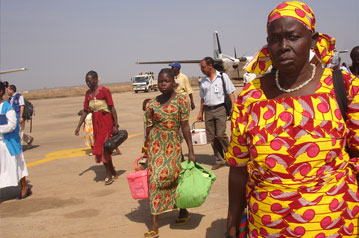Number of refugees returning to southern Sudan tops 100,000 mark
Number of refugees returning to southern Sudan tops 100,000 mark

KHARTOUM, Sudan, January 30 (UNHCR) - More than 100,000 refugees have returned to southern Sudan since the launch of a voluntary repatriation programme two years ago, including some 30,000 with the help of UNHCR.
The milestone was passed at the weekend with a flight from the Central African Republic to the southern Sudan town of Juba and a road convoy from Kakuma refugee camp in north-west Kenya to Kapoeta in Sudan's Eastern Equatoria state.
These brought the total number of returns to South Sudan from seven neighbouring countries to 100,574 since January 2005. More than 30,000 were helped by the UN refugee agency, including the latest returnees.
"This just shows that despite the volatile security situation, which still remains a huge concern in South Sudan, people are very determined to come back and rebuild their country," said Chrysantus Ache, UNHCR representative in Khartoum. "They have been in exile for so many years, sometimes for two decades, and they are longing to come back."
Repatriations from Central African Republic, the Democratic Republic of the Congo (DRC), Uganda, Kenya and Ethiopia are conducted under tripartite agreements and take place by air and by road through various border crossing points.
The returnees are given an aid package of basic household supplies, including blankets, mosquito nets, soap, plastic mats, kitchen sets, jerry cans and sanitary items to help them restart their lives in Sudan. Upon return, they also receive a three-month food ration from the World Food Programme and seeds and tools from the UN Food and Agriculture Organisation.
All returnees, as well as internally displaced persons and receiving communities, equally benefit from UNHCR community-based reintegration projects focusing on water, health and education in areas of return. The goal is to prevent further displacement and to induce returnees to stay.
"After more than 21 years of civil war in southern Sudan, almost no basic infrastructure was left," UNHCR's Ache noted. "The humanitarian community has been trying to develop basic services in order to offer minimum conditions to the returnees and to address their immediate needs," he explained, while adding that development agencies should also be looking at larger, long-term projects.
More than 100,000 Sudanese refugees are expected to return home from this year. But this depends on an improved security situation, progress in peace talks between the Lord's Resistance Army and the government of Uganda, which hosts the largest Sudanese refugee population (156,000), and unforeseen events that can affect returns such as a recent meningitis outbreak in northern Uganda. Movements from northern Uganda have been suspended for several weeks pending the vaccination of potential returnees.
Some of the South Sudan refugees will return with transport organised by UNHCR and other partners from refugee camps or settlements. Under an assisted, self-organised repatriation programme, others will receive return documents and a return and reintegration package in the country of asylum and upon arrival in Sudan. Thousands more are expected to return home using their own means in what is commonly referred to as spontaneous repatriation.
UNHCR has held a series of cross-border meetings with neighbouring countries to firm up repatriation plans for 2007. This includes establishing new calendars for resumed operations from areas such as north-eastern DRC and opening new return routes such as the Dimma/Gambella (Ethiopia) to Pagak corridor in Upper Nile.
Repatriation from Ethiopia will be discussed further at meetings on Thursday and Friday in Addis Ababa between UNHCR and the governments of Ethiopia and Sudan. An estimated 340,000 Sudanese refugees remain in exile, mainly in Kenya, Uganda and Ethiopia.
By Millicent Mutuli in Khartoum, Sudan







